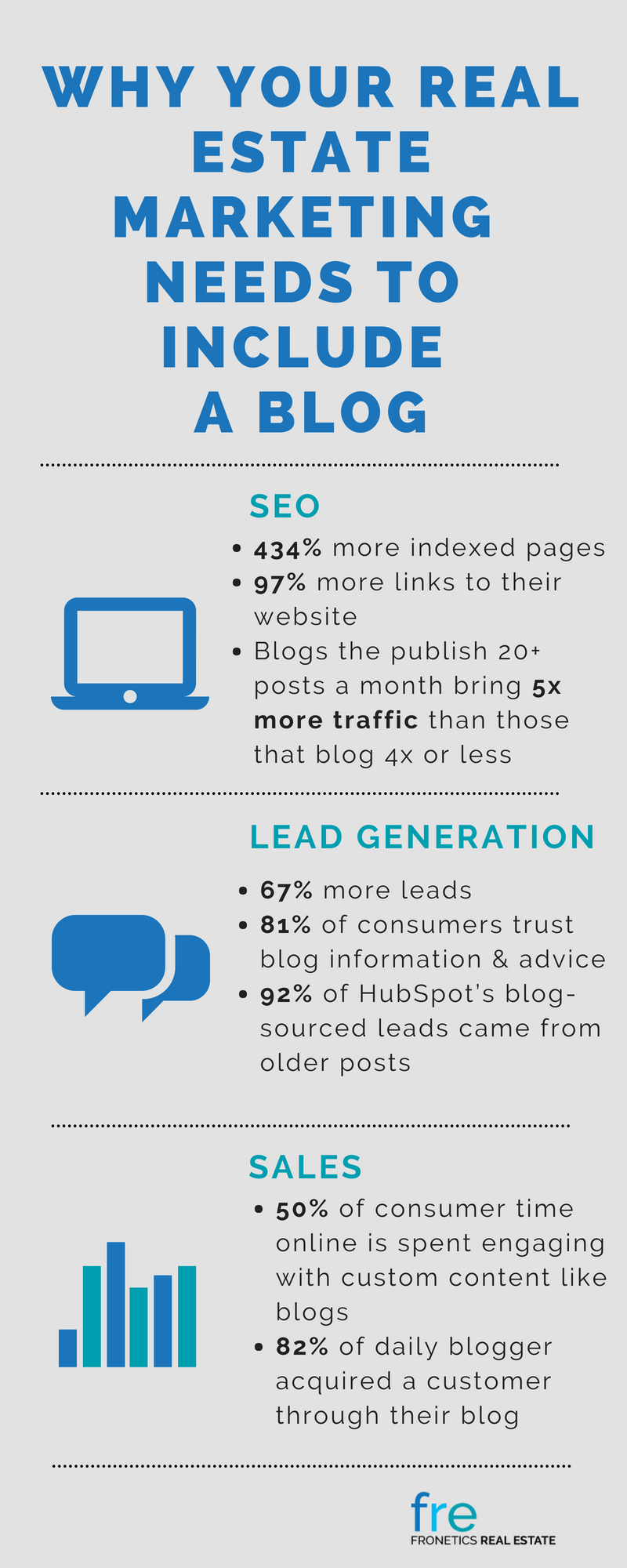Posts Tagged "HubSpot"

Top 5 Blogs for Real Estate Marketers
Blogs are an ideal source of knowledge and insights for real estate marketing professionals. Here are our favorite five blogs for real estate marketers to follow.
Highlights:
- Up-to-date knowledge is crucial for real estate marketers.
- Following the right blogs sets you up for success and keeps you aware of conversations in the industry.
- These five blogs for real estate marketers are our favorite sources of knowledge and insights.
Promoting your properties, growing your business, converting leads — it’s all about having the knowledge-base that shapes your strategies and solutions. There’s always something new to learn in real estate marketing. We think this makes it an incredibly exciting field — but we also know that it can be equally overwhelming.
If you know where to look, there’s a vibrant conversation going on among real estate marketers as an ever-growing field of ideas is being generated and discussed. We’ve compiled this list of our five favorite blogs for real estate marketers that we think you should be following, too. These are ideal places for information and ideas about overall best practices, social media use, writing effective content, and more.
5 blogs for real estate marketers
1. Propmodo Real Estate
Propmodo Real Estate is the place for cutting-edge insights into how technology is changing the way commercial real estate is acquired, managed, and used. This multimedia site follows people, practices, and tools that are shaping the business of real estate.
A few of our favorite posts include a discussion of the commercial real estate sector’s embrace of lease automation, and “Viral Marketing and Buzz Marketing: What is Better for Real Estate Business?”
2. BombBomb
Like Propmodo, BombBomb’s blog is real estate-specific and dedicated to building relationships through video to create more opportunities in email, text, and social media. It’s particularly strong on email marketing, which is still the most profitable form of marketing online.
We love what BombBomb has to say about the nuts and bolts aspects of real estate marketing, but they also have some great think pieces. For example, a recent post and podcast episode on “Trust, Neuroscience, and the Customer Experience” explored the neuroscience behind trusting relationships with clients, the nature of trust itself, and how to cultivate it.
3. HubSpot Marketing
HubSpot Marketing is a phenomenal resource for all content marketers, including real estate marketers. It covers everything you need to know to become a marketing whiz. Topics include SEO, blogging, social media, lead generation, email marketing, lead management, analytics, and more.
These experts in content marketing may not be writing specifically about real estate, but we have them on the list, since it’s worthwhile for real estate marketers to be aware of the larger ideas and solutions being discussed as it pertains to content marketing.
4. Geek Estate
A good choice for the tech-savvy marketer, Geek Estate focuses on what’s happening in real estate technology — for example, the changes happening with Zillow and Trulia. This is a great resource for being on the cutting-edge of upcoming trends.
Geek Estate is a private community of real estate technologists, innovators, and founders. Much of their content requires a subscription, and membership could be well worth your while. The blog has recently tackled the subject of “Uberizing Real Estate with Zillow Offers.”
5. Social Media Today
Like Hubspot, Social Media Today isn’t specifically focused on real estate. However, it’s a great go-to resource for all things social media, a crucial topic for real estate marketers. The blog frequently features insights from leaders in the field. And SMT’s team of influencers covers topics including social media developments, trending, social marketing, digital strategy, and content marketing.
SMT is a particularly good source of up-to-the-minute news from the social media and larger tech sector. The site keeps closely abreast of the latest developments, and keeps a roundup of social media updates separately archived for easy perusal.
Read them all or pick your favorite — you’ll benefit from increasing your knowledge.
Related Posts:
- Infographic: Real Estate Social Media Marketing Strategies
- A Visual Guide to Social Media Posting Frequency for Real Estate
- Video: Top Real Estate Marketing Trends 2019
Posts Tagged "HubSpot"

4 Real Estate Blogging Tools You Should be Using
If you’re a real estate marketer, you should be blogging. These four free tools can help you get your real estate blog started.
A real estate blog is one of the most effective ways to generate leads, improve brand recognition, and market your properties. At Fronetics Real Estate, we love blogging for tons of reasons. For one, you get plenty of bang for your buck: once you publish an effective post, it can continue generating leads even years into the future.
Are you ready to up your blogging game? Here are 4 of FRE’s favorite free online tools for real estate blogging that you can start using today.
Generate a topic for your real estate blog
Sometimes the ideas just flow, but often, coming up with fresh, engaging topics is like pulling teeth. The good news is, Hubspot’s Blog Ideas Generator is here to help.
Think Mad Libs: give HubSpot three nouns, and this powerful tool will give you topic ideas. It’s a great way to focus on topics where you want to cultivate your authority and to generate real estate blog post ideas for a topic cluster, in line with existing pillar content.
Is your headline engaging?
Judging a book by its cover may be a bad idea, but when it comes to blogging, the headline of your post is hugely important. So, regardless of how compelling your content is, if you don’t have an effective headline, it’s likely not reaching its audience potential.
ShareThrough has a tool that can help. The SharedCount Headline Analyzer lets you enter your idea for a title, and helps you refine and improve your headline. Run it until you get a good score (at least 75), using their tips as you go to edit and optimize the title of your real estate blog post.
Bump up your image game
We live in a world where, increasingly, the visual is key. A picture is worth a thousand words—but only if it’s a good one! Too often, bloggers forget this crucial aspect of online story-telling and settle for tired stock photos or the first result that comes up on Google Images.
One of the best online graphic editing and creation tools out there is Canva. We love this tool, which lets you save your brand colors and fonts, and create beautiful, original graphics for blog images, Facebook ads, postcards, eBooks, and more.
Boost your SEO
Generating organic traffic with your content is one of the main benefits of blogging. Your content helps inform search engines about your site, improving your rank in relevant search queries. But writing SEO-friendly content isn’t always a walk in the park.
Luckily, there are tools like Yoast SEO to help. This plugin helps you optimize your content, as it analyzes your writing, and gives you suggestions for optimizing it for Google’s algorithm.
We’ve said it before and we’ll probably say it again—when it comes to real estate marketing, a real estate blog is one of your most powerful assets. Give these tools a try—and let us know in the comments how they work for you.
Related posts:
- 5 Ways to Generate Real Estate Blog Ideas
- Infographic: Statistics that Prove Why Your Real Estate Marketing Needs to Include a Blog
- 4 Ways a Blog Can Help You Sell Real Estate
Posts Tagged "HubSpot"

5 Ways to Generate Real Estate Blog Ideas
A real estate blog is one of the best ways to market your brand and properties. These five tools can help you generate relevant, engaging ideas.
We’ve said it before, and we’ll certainly say it again—a real estate blog is one of the best ways you can market your properties. Blogging helps increase search engine visibility, establish your brand, and drive web traffic (new leads). Maintaining an active blog also helps you build and maintain relationships and establish yourself as a trusted resource.
So, blogging is great for your business—but what happens when you can’t think of anything to write about. Content creation possibilities are endless but generating topics can nevertheless be daunting sometimes.
As usual, the internet is here to rescue you. To get you started, here are five of our favorite sources for generating real estate blog ideas.
1. Hubspot’s Blog Ideas Generator
Think Mad Libs: Give HubSpot three nouns, and its Blog Ideas Generator will give you topic ideas. This tool is a great way to focus on topics where you want to cultivate your authority and to generate blog post ideas for a topic cluster, in line with existing pillar content.
2. Google AdWords Keyword Planner
A free tool that allows you to search for a keyword related to your topic, Google AdWords Keyword Planner helps keep you on message by providing hundreds of keywords and phrases to help you generate ideas.
3. HitTail
This keyword analysis tool makes use of Google Analytics and Google Webmaster Tools data. It determines which keywords are driving traffic to your website and suggests additional keywords you could target to optimize traffic. Use these keyword suggestions to come up with real estate blog topic ideas.
4. Alltop
Co-created by legendary business advisor and author Guy Kawasaki, Alltop aims to help you answer the question “what’s happening” in topics that pertain to your business. Essentially, it provides a list of recent posts from the most trusted blogs on each topic. It’s a great “in” on the most important conversations going on among thought leaders in the real estate industry.
5. Ubersugggest
It may not be the best tool for coming up with actual post titles, but for generating general topic ideas, you can make Ubersuggest your go-to. Enter a word or phrase, and Ubersuggest produces a long list of results containing the word or phrase followed by related phrases.
Bonus: Twitter
Yes, you read that right. Twitter can actually be a useful tool to generate blog post ideas. Try running a Twitter search using your keyword proceeded by a hashtag (#properties, for example) to get a list of tweets containing your keyword. Twitter also has the bonus of being likely the most up-to-date conversation you can find on the web.
Now, all you need to do is to compile a list of real estate blog ideas, create an editorial calendar, and get started.
Related posts:
- 10 Must-Follow Blogs for Real Estate Marketers
- 4 Types of Content You Need to Sell Real Estate (Besides Listings)
- 4 Real Estate Marketing Trends 2018
Posts Tagged "HubSpot"

Infographic: Statistics that Prove Why Your Real Estate Marketing Needs to Include a Blog
If you’re a real estate marketer who’s not blogging, you’re missing out.
Everyone knows you need a property website to succeed in this industry. But when it comes to making that website competitive, many abandon the brightest idea that would help them in doing so — namely, blogging.
Real estate blogging does its bit for lead generation, SEO, and sales. So if you think your property can thrive without it, you might want to think again.
Search engine visibility
As search engine algorithms get increasingly complex and sophisticated, the quality of your website’s content becomes more and more important. It’s your content that informs search engines about your site (not just keywords anymore), improving your rank in relevant search queries. And the stats bear it out — according to HubSpot, companies that blog receive 434% more indexed pages on average and 97% more links to their website.
Another fact to consider: according to a recent study by Search Metrics, the average word count of the highest ranking content in Google is between 1,140-1,285 words. In other words, long-form content, like blog posts, is one of the best things you can do to improve your website’s SEO.
But don’t be fooled into thinking that quantity outranks quality. Simply pumping out a high word count isn’t enough. Your content needs to be well-written, thoroughly researched, and engaging.
Lead generation
Blog content is ideal to share (and link to) in email or social media marketing campaigns. It can help undecided leads learn about your properties and sway them in a positive direction. Sharing your blog posts on your social media accounts helps give validity and authority to your company, as you disseminate content you created yourself.
A recent study from the Content Marketing Institute found that 67% more leads are generated by companies with an active blog. Not only that, 81% of U.S. online consumers trust information and advice from blogs. So your blog is your best bet in terms of becoming a trusted resource for your audience — leading directly to more effective lead generation and nurturing.
Sales and relationships
61% of buyers report feeling better about a company that delivers custom content and are therefore more likely to buy from that company. And furthermore, HubSpot reports that 50% of consumer time online is spent engaging with custom content — like blogs. And perhaps most powerfully, 82% of marketers who blog daily acquired a customer using their blog, as opposed to 57% of marketers who blog monthly. Blogging helps you sell real estate, and it helps you build lasting and fruitful relationships with your audience.
Check out our infographic for statistics on why your real estate marketing strategy should include blogging.
Infographic: Why your real estate marketing should include a blog
Related posts:
- 4 Ways a Blog Can Help You Sell Real Estate
- Drive More Traffic and Generate More Leads with Your Real Estate Blog with our Editorial Calendar Template
- Fronetics Real Estate Blog Named Top 60 Real Estate Marketing Blog
Posts Tagged "HubSpot"

Our 6 Favorite Marketing Automation Tools for Real Estate Marketers
Check out these marketing automation tools for email workflows, social media scheduling, and customer relationship management.
Lately it seems like everyone is talking about marketing automation. As real estate buyers increasingly demand personalized experiences through the buyer’s journey, marketers’ jobs are getting tougher. They need to provide custom lead-nurturing content to all prospects in their databases.
And that’s where automating marketing tasks can help.
The term “marketing automation” refers to a variety of tools used to automate the process of personalizing leads’ interactions with your property. The sheer variety of these tools can sometimes be overwhelming — so we’ve pulled a few of our favorites in the categories of email workflows, social media scheduling tools, and customer relationship management.
6 marketing automation tools for real estate marketers
Email workflows
1. Customer.io
This tool lets you send targeted messages to your prospects, crafting them based on how they interact with your property, and making personalized messages simple. You can also keep track of conversions and create customer profiles. Our favorite part? It integrates with your mobile app or website, letting you see data in real time and trigger actions by adding in predefined rules.
2. Constant Contact
This powerful tool has some features that are unique — and can take your marketing capabilities beyond the basics. Beyond setting up and managing an automated database, Constant Contact offers Facebook fan promotion, coupons and deals, and event management.
Social media scheduling tools
3. AdRoll
This is an extremely effective tool for retargeting prospects through re-engagement on Facebook, Twitter, and elsewhere on the web. It offers cross-device and cross-platform retargeting capabilities, as well as flexible segmentation, letting you provide customized experiences that dramatically improve your marketing efficiency. It also offers customized budgeting and full control over ad spend.
Customer relationship management (CRM)
4. Pardot
Pardot is an all-inclusive marketing automation suite, but it’s particularly strong for amping up your engagement with CRM integration. It’s a great tool for helping your sales team shorten the sales cycle. And, in addition to CRM integration, it offers email marketing, lead nurturing, lead scoring, and ROI reporting.
5. Marketo
This cloud-based marketing software lets you drive revenue with lead management and mobile marketing. It not only helps build prospect relationships, but it helps you sustain them as well. Best of all, you can try it out for free until you’re sure it’s right for your company.
Bonus all-in-one tool: HubSpot
HubSpot is an inbound-marketing tool that lets you generate leads, close deals, and manage your sales pipeline from start to finish. It integrates beautifully with a content marketing strategy, with the goal of turning outbound leads into inbound ones. It includes revenue reporting, custom-event reporting, custom-event automation triggers, predictive-lead scoring, contacts and company reporting, and event-based segmentation.
What marketing automation tools do you use?
Related posts:




